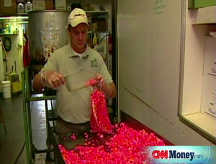Slow sales? No credit? No problem
While many small business owners are feeling the crunch, others see opportunities in the market slowdown.
(CNNMoney.com) -- Credit is tight and consumers are nervous about spending. The current economic situation is especially grim for small businesses.
It's good thing that entrepreneurs thrive on adversity.
As many companies face a slowdown in business, some owners are fighting the sales slump by exploring new marketing strategies, stepping up their customer service and deepening their relationships with other businesses.
"My most valuable asset is my time," says Heather von Bargen, president of Caladesi Capital in New Port Richey, Fla. "Though our volume may be down, we're now spending more time being proactive with our current clients."
Caladesi Capital helps companies that need to lease equipment connect with and pay their suppliers. Fewer sales means more time to devote to each individual customer, von Bargen says. Caladesi Capital's representatives are now offering their clients more help understanding and cleaning up their credit scores, taking the time to go through credit bureau reports and make suggestions.
"This isn't a time to sit and fret," says Jeff Mesquita, a SCORE counselor in Atlanta. "This should be an opportunity to evaluate your business because you have the time to do it. Look at your products, your services and your company overall and see where you can improve. Treat this as learning experience."
The economic climate is undeniably tough for small companies: In an August National Small Business Association (NSBA) survey released last week, 67% of those polled said they had been affected by the credit crunch, and 53% cited economic uncertainty as the greatest threat to their company's growth or survival. But despite the bad news, entrepreneurs tend to be optimistic about their own prospects: 75% of those surveyed said they're confident about the future of their own businesses.
"From talking with small business owners, it seems that some industries have it worse than others," says NSBA President Todd McCracken. "For instance, exporters are bright spots because of the low dollar, while industries related to housing are chiefly affected because of the mortgage crisis."
Serial entrepreneur Steve Bloom is accustomed to looking for the upside in down times.
"It's not good out there - I can empathize because I have had business failures in the past. But I know that with every tragedy, there is opportunity," says Bloom, who currently owns several housing units in Newark, N.J. "Is the glass half empty or half full? A shuttered business may be a bad sign, but also may have equipment that you can now buy on the cheap. It's all about how you approach the problem."
For example, thanks to challenges in the auto industry, businesses that need delivery vehicles and trucks are in luck - prices have never been lower for both used and new vehicles, Bloom notes.
Like von Bargen, First Call Resolution CEO John Stadter uses slow times to firm up relationships with clients and prospects. Business at his Roseburg, Ore., customer-service outsourcing center has doubled every year since 2005, and Stadter expects this year to continue the streak.
"In bad times, companies are looking to save money," he explains. "When we make our sales calls, the prospects are eager to listen to new ideas, even if they've put us off in years past."
But Stadter is keeping an eye on growth, making sure to carefully screen new clients. Entrepreneurs need to be careful not to lower their standards when sales get tougher.
"A customer that won't pay is worse than a customer you don't have," he says. "Don't grow for growth's sake, and don't be afraid to shrink if you need to shrink."
In her commercial equipment financing company, von Bargen has also been selective. "We've used this time to examine our company to find out which type of clients we work best with," she says. "There's no point in putting a square peg in a round hole."
In one of the hardest-hit industries, housing, custom homebuilder Munson Builders in Fairfield, Conn. is ignoring all negativity and focusing on its growth plans. Founder Calvin Munson is investing in an overhaul of his company's Web site, hoping to draw in people browsing the Internet to get design ideas for their homes. He's also adjusting his marketing spending, putting less money into general-audience newspaper ads and more into advertising online and in real-estate agent trade publications.
In business since 1975, Munson has weathered boom and bust cycles and shrugs off doomsday predictions. "We acknowledge the bad news but we don't give it power," says Maureen Jacobson, vice president of sales . "We're in it for the long haul."
That outlook appeals to Caladesi Capital's von Bargen. "I feel like people are spending time screaming that the sky is falling, which just propels the negativity," she says. "But people are attracted to the positive, to what makes them feel. So even if you don't think positively, act like it for the sake of your clients and employees!" ![]()
'Who will bail us out?': As banks clamp down on lending, companies are struggling to survive. Entrepreneurs around the U.S. wrote in to tell us how they're weathering the turmoil.
Credit crunch freezes hiring, expansion
Defying the downturn: 5 strategies
-
The Cheesecake Factory created smaller portions to survive the downturn. Play
-
A breeder of award-winning marijuana seeds is following the money and heading to the U.S. More
-
Most small businesses die within five years, but Amish businesses have a survival rate north of 90%. More
-
The 10 most popular franchise brands over the past decade -- and their failure rates. More
-
These firms are the last left in America making iconic products now in their twilight. More















